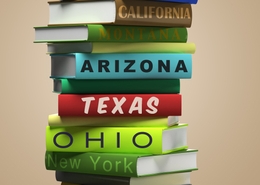
As the furor over the State Board of Education’s ideological rewriting of social studies standards has exploded nationally in recent weeks, a primary narrative has emerged: that whatever 15 politicians in Texas (or at least the rightest-leaning half of them) decide will be published in textbooks nationwide for years to come.
That fear has already stoked a political backlash: One California state senator isdrafting legislation to keep any hint of the Texas version of U.S. history out of California textbooks. “The de-emphasis on civil rights in so many areas — reducing the scope of Latino history, especially in a state like Texas — is just mind-boggling,” said Adam Keigwin, chief of staff for San Francisco Democrat Leland Yee.
But Yee and his liberal-to-moderate contemporaries in other states need not fret, textbook industry experts say. Though Texas has been painted in scores of media reports as the big dog that wags the textbook industry tail, that’s simply no longer true — and will become even less true in the future, as technological advances and political shifts transform the marketplace, said Jay Diskey, executive director of the Association of American Publishers. Diskey calls the persistent reports of Texas dominating the market an “urban myth.” Yet the myth persists.
“I’ve been in this job about three and a half years, and I see it reported all the time,” Diskey said.
